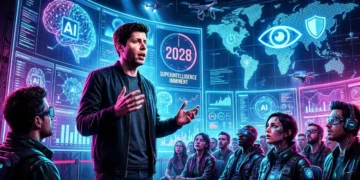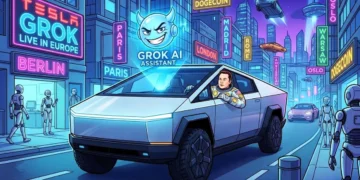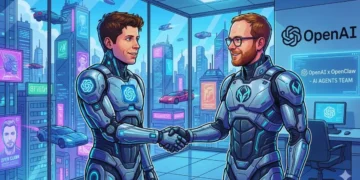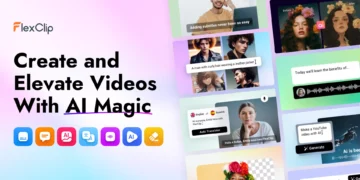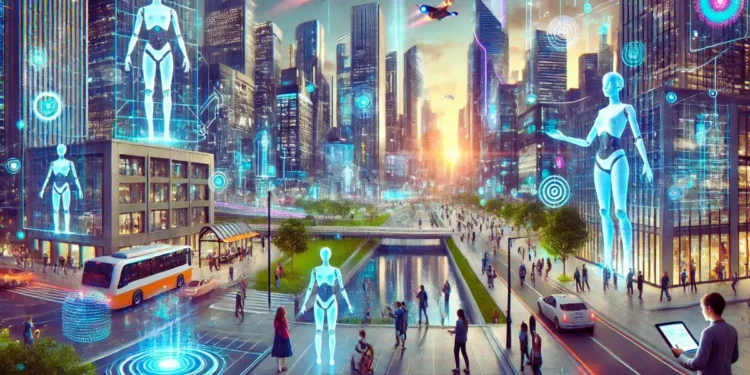Artificial Intelligence (AI) is no longer science fiction—it’s here, and it’s reshaping our world at an unprecedented pace. From healthcare to education, finance to law enforcement, AI changing the world is a reality we can no longer ignore. But with this rapid advancement comes a burning question: Will artificial intelligence replace humans, or work alongside them?
The debate over AI vs human intelligence is fierce. Some fear that artificial intelligence will replace humans, while others believe it will unlock unprecedented opportunities. So, how do you think AI will evolve in the next 10-20 years? And more importantly, what is the future of AI in shaping our society?
In this article, we’ll explore the impact of artificial intelligence on human society and bioethics, examine the role of artificial intelligence in the future, and answer critical questions like “Is AI good or bad?” and “How can humans and AI work together?”
Understanding Artificial Intelligence: What Is It?
Before we explore the role of artificial intelligence in the future, let’s first define what it means. According to MIT Technology Review, what is artificial intelligence it’s a branch of computer science that enables machines to perform tasks that typically require human intelligence, such as learning, reasoning, problem-solving, perception, and language understanding.
The concept may sound futuristic, but AI is changing the world is already. In fact, by 2025, the global AI market is expected to surpass $300 billion, according to Statista. So, the real question now isn’t if AI will change society, but how and to what extent.
AI in Society: A Double-Edged Sword
When discussing artificial intelligence in society, we must consider both the benefits and the risks. On one hand, AI offers incredible efficiency gains, automation, and innovation. On the other hand, concerns about privacy, bias, job displacement, and ethical issues have sparked heated debates.
Ethical Dilemmas: Bioethics and AI
One of the most pressing topics within the impact of artificial intelligence on human society and bioethics is the use of AI in healthcare decision-making and genetic engineering. For example, AI-powered diagnostics can save lives, but who takes responsibility if the algorithm makes a mistake?
According to the Stanford Encyclopedia of Philosophy, the integration of AI into life-critical systems raises questions around autonomy,
consent, and fairness. These concerns are not just theoretical—they’re shaping regulations and public opinion today.
So, while AI vs human arguments often dominate headlines, the truth lies somewhere in between: AI and humans need to collaborate ethically and responsibly.
The Role of Artificial Intelligence in the Future
Artificial intelligence is poised to play a pivotal role in shaping the future of our society. From automating routine tasks to driving innovation in various sectors, AI is becoming an integral part of our lives. As we look ahead, it is crucial to understand how AI will evolve and how it will impact different aspects of our existence.
Automation and Efficiency
One of the most significant impacts of AI is its ability to automate tasks that were previously performed by humans. This automation can lead to increased efficiency and productivity across various industries. For instance, AI can handle repetitive tasks in manufacturing, freeing up human workers to focus on more creative and strategic activities. This shift can lead to a more productive and innovative workforce.
Innovation and Creativity
AI is not just about automation; it is also a powerful tool for innovation. By analyzing vast amounts of data, AI can identify patterns and insights that humans might miss. This capability can drive innovation in fields such as healthcare, where AI can help in the development of new treatments and drugs. Additionally, AI can assist in creative endeavors, such as art and music, by generating new ideas and compositions.
Ethical Considerations
While the benefits of AI are numerous, it also raises important ethical considerations. As AI systems become more integrated into our lives, there is a growing concern about job displacement. Automation can lead to the loss of jobs in certain sectors, which can have significant socio-economic implications. Furthermore, the ethical use of AI in decision-making processes, such as hiring or lending, must be carefully considered to avoid biases and ensure fairness.
Healthcare Innovations
AI is accelerating drug discovery, enabling personalized medicine, and improving diagnostic accuracy. IBM Watson Health and Google’s DeepMind are already making waves in this space.
Environmental Sustainability
AI models help track climate change, optimize energy consumption, and manage wildlife conservation efforts. Tools powered by AI changing the world are being used to fight deforestation and reduce carbon emissions.
Education and Accessibility
With tools like ChatGPT and Duolingo Max, AI and humans are redefining how we learn. Personalized tutoring and adaptive learning platforms are making education more accessible than ever before.
The Impact of Artificial Intelligence on Human Society and Bioethics
The integration of AI into society has far-reaching implications, both positive and negative. On the positive side, AI can enhance our quality of life by providing better healthcare, improving education, and making our daily tasks more efficient. However, it also presents challenges, such as the potential for increased surveillance and the ethical dilemmas surrounding the use of AI in decision-making processes.
Healthcare
In the healthcare sector, AI is revolutionizing the way we diagnose and treat diseases. By analyzing large datasets, AI can identify patterns and correlations that can lead to more accurate diagnoses and personalized treatment plans. This can significantly improve patient outcomes and reduce the burden on healthcare professionals.
Education
AI is also transforming the education sector. Personalized learning experiences, powered by AI, can adapt to the individual needs of students, making education more effective and engaging. AI can also assist teachers by automating administrative tasks, allowing them to focus more on teaching and student interaction.
Surveillance and Privacy
One of the most concerning aspects of AI is its potential for increased surveillance. As AI systems become more advanced, they can be used to monitor and analyze human behavior on a large scale. This raises important questions about privacy and the ethical use of AI in surveillance activities.
AI Changing the World
AI is already changing the world in profound ways. From self-driving cars to virtual assistants, AI is becoming an integral part of our daily lives. As we look to the future, it is essential to consider how AI will continue to evolve and impact various aspects of our society.
Transportation
Self-driving cars, powered by AI, have the potential to revolutionize the way we travel. By reducing human error, these vehicles can make our roads safer and more efficient. However, there are also concerns about the ethical implications of autonomous vehicles, such as decision-making in critical situations.
Virtual Assistants
Virtual assistants, like Siri and Alexa, are becoming increasingly common in our homes. These AI-powered devices can help us with various tasks, from setting reminders to controlling smart home devices. However, they also raise questions about privacy and the security of the data they collect.
How Do You Think AI Will Evolve in the Next 10-20 Years?
The future of AI is both exciting and uncertain. As AI continues to evolve, it has the potential to transform industries, create new job opportunities, and improve our quality of life. However, it also presents challenges, such as job displacement and ethical considerations, that need to be carefully managed.
Job Creation
While AI may automate certain jobs, it also has the potential to create new job opportunities. As AI systems become more advanced, there will be a growing demand for professionals who can develop, maintain, and ethically manage these systems. This can lead to the creation of new jobs in the tech industry and beyond.
Ethical Management
The ethical management of AI will be crucial in the coming years. As AI becomes more integrated into our lives, it is essential to ensure that these systems are used responsibly and ethically. This includes addressing biases in AI algorithms and ensuring that AI is used to benefit society as a whole.
AI vs Human
The relationship between AI and humans is complex and evolving. While AI has the potential to enhance human capabilities, it also raises questions about the future of work and the role of humans in an AI-driven society.
Collaboration
One of the most promising aspects of AI is its potential to collaborate with humans. By combining the strengths of AI and human intelligence, we can achieve outcomes that would not be possible with either alone. This collaboration can lead to increased innovation, productivity, and problem-solving capabilities.
Job Displacement
One of the most significant concerns about AI is its potential to displace human jobs. As AI systems become more advanced, they can automate tasks that were previously performed by humans. This can lead to job loss in certain sectors, which can have significant socio-economic implications.
Human-AI Partnerships
To mitigate the potential negative impacts of AI, it is essential to foster human-AI partnerships. By focusing on the strengths of both AI and human intelligence, we can create a future where AI enhances human capabilities rather than replacing them. This includes developing AI systems that augment human decision-making and creativity.
Is AI Good or Bad?
The question of whether AI is good or bad is complex and multifaceted. While AI has the potential to bring about significant benefits, it also presents challenges that need to be carefully managed.
Benefits
AI has the potential to bring about numerous benefits, such as increased efficiency, innovation, and improved quality of life. By automating tasks and analyzing large datasets, AI can drive progress in various fields, from healthcare to education.
Challenges
However, AI also presents challenges, such as job displacement, ethical considerations, and the potential for increased surveillance. These challenges need to be carefully managed to ensure that AI is used responsibly and ethically.
The Collaboration Between Humans and AI
The collaboration between humans and AI is crucial for maximizing the benefits of AI while mitigating its potential negative impacts. By focusing on the strengths of both AI and human intelligence, we can create a future where AI enhances human capabilities rather than replacing them.
Augmenting Human Capabilities
One of the most promising aspects of AI is its potential to augment human capabilities. By combining the strengths of AI and human intelligence, we can achieve outcomes that would not be possible with either alone. This includes using AI to enhance human decision-making, creativity, and problem-solving capabilities.
Ethical Considerations
The ethical considerations of AI are complex and multifaceted. As AI systems become more integrated into our lives, it is essential to ensure that they are used responsibly and ethically. This includes addressing biases in AI algorithms and ensuring that AI is used to benefit society as a whole.
The Relationship Between Humans and AI
The relationship between humans and AI is complex and evolving. While AI has the potential to enhance human capabilities, it also raises questions about the future of work and the role of humans in an AI-driven society.
Future of Work
One of the most significant concerns about AI is its potential to displace human jobs. As AI systems become more advanced, they can automate tasks that were previously performed by humans. This can lead to job loss in certain sectors, which can have significant socio-economic implications.
Human-AI Collaboration
To mitigate the potential negative impacts of AI, it is essential to foster human-AI collaboration. By focusing on the strengths of both AI and human intelligence, we can create a future where AI enhances human capabilities rather than replacing them. This includes developing AI systems that augment human decision-making and creativity.
Can AI and Humans Coexist?
The question of whether AI and humans can coexist is complex and multifaceted. While AI has the potential to bring about significant benefits, it also presents challenges that need to be carefully managed.
Coexistence
AI and humans can coexist in a way that maximizes the benefits of AI while mitigating its potential negative impacts. By focusing on the strengths of both AI and human intelligence, we can create a future where AI enhances human capabilities rather than replacing them.
Ethical Management
The ethical management of AI will be crucial in the coming years. As AI becomes more integrated into our lives, it is essential to ensure that these systems are used responsibly and ethically. This includes addressing biases in AI algorithms and ensuring that AI is used to benefit society as a whole.
How Will AI Affect Us in the Future?
The future impact of AI on society is both exciting and uncertain. As AI continues to evolve, it has the potential to transform industries, create new job opportunities, and improve our quality of life. However, it also presents challenges, such as job displacement and ethical considerations, that need to be carefully managed.
Transforming Industries
AI has the potential to transform various industries, from healthcare to education to manufacturing. By automating tasks and analyzing large datasets, AI can drive innovation and increase efficiency in these sectors.
Job Creation and Displacement
While AI may automate certain jobs, it also has the potential to create new job opportunities. As AI systems become more advanced, there will be a growing demand for professionals who can develop, maintain, and ethically manage these systems. However, the potential for job displacement remains a significant concern that needs to be carefully managed.
Ethical Considerations
The ethical considerations of AI are complex and multifaceted. As AI systems become more integrated into our lives, it is essential to ensure that they are used responsibly and ethically. This includes addressing biases in AI algorithms and ensuring that AI is used to benefit society as a whole.
The Future of Society with AI
The future of society with AI is both promising and challenging. While AI has the potential to bring about significant benefits, it also presents challenges that need to be carefully managed.
Innovation and Creativity
AI is a powerful tool for innovation and creativity. By analyzing large datasets and identifying patterns, AI can drive progress in various fields, from healthcare to art. This can lead to increased innovation and creativity in our society.
Ethical Management
The ethical management of AI will be crucial in the coming years. As AI becomes more integrated into our lives, it is essential to ensure that these systems are used responsibly and ethically. This includes addressing biases in AI algorithms and ensuring that AI is used to benefit society as a whole.
The Biggest Problem in AI
One of the biggest problems in AI is the potential for job displacement. As AI systems become more advanced, they can automate tasks that were previously performed by humans. This can lead to job loss in certain sectors, which can have significant socio-economic implications.
Mitigating Job Displacement
To mitigate the potential negative impacts of AI, it is essential to foster human-AI collaboration. By focusing on the strengths of both AI and human intelligence, we can create a future where AI enhances human capabilities rather than replacing them. This includes developing AI systems that augment human decision-making and creativity.
How Will AI Relate to Humans?
The relationship between AI and humans is complex and evolving. While AI has the potential to enhance human capabilities, it also raises questions about the future of work and the role of humans in an AI-driven society.
Collaboration
One of the most promising aspects of AI is its potential to collaborate with humans. By combining the strengths of AI and human intelligence, we can achieve outcomes that would not be possible with either alone. This collaboration can lead to increased innovation, productivity, and problem-solving capabilities.
Ethical Considerations
The ethical considerations of AI are complex and multifaceted. As AI systems become more integrated into our lives, it is essential to ensure that they are used responsibly and ethically. This includes addressing biases in AI algorithms and ensuring that AI is used to benefit society as a whole.
What Will Be the Next Big Thing After AI?
The next big thing after AI is uncertain, but it is likely to involve advancements in fields such as quantum computing, biotechnology, and space exploration. These advancements have the potential to further transform our society and drive innovation in new and exciting ways.
Quantum Computing
Quantum computing is one of the most promising fields for the next big thing after AI. By harnessing the power of quantum mechanics, quantum computing has the potential to solve complex problems that are currently beyond the reach of classical computers. This can lead to advancements in various fields, from cryptography to drug discovery.
Biotechnology
Biotechnology is another field that holds great promise for the future. By combining AI with biotechnology, we can drive innovation in fields such as healthcare and agriculture. This can lead to the development of new treatments, drugs, and sustainable farming practices.
Space Exploration
Space exploration is an exciting frontier for the next big thing after AI. By using AI to analyze large datasets and identify patterns, we can drive innovation in space exploration and make discoveries about our universe.
The Future of AI and Human Interaction
As we look toward the future of AI , one thing is clear: AI will continue to evolve—and so must our relationship with it.
How Do You Think AI Will Evolve in the Next 10–20 Years?
Experts predict that the future of AI will be marked by advancements in natural language processing, autonomous vehicles, and general AI—machines capable of performing any intellectual task a human can.
However, the timeline remains uncertain. Some researchers, like those at DeepMind and OpenAI, believe general AI could emerge within 30–50 years. Others caution that such predictions are speculative at best.
What’s more certain is that AI and humans will increasingly share workspaces, homes, and even emotional connections. This leads us to another crucial discussion: can AI and humans coexist in a way that benefits both?
Debunking Myths: Will AI Replace Humans by 2050?
The Reality of AI Job Displacement
While some jobs will be automated, new roles will emerge. A McKinsey report estimates that by 2030, AI could create more jobs than it displaces.
Will AI replace humans by 2050? Unlikely. Instead, expect:
Reskilling programs for displaced workers.
New career paths in AI ethics and maintenance.
Is It Possible That AI Will Replace Humans?
True Artificial General Intelligence (AGI)—AI with human-like reasoning—is decades away. For now, AI excels in narrow tasks but lacks human intuition.
What will be the next big thing after AI? Quantum computing or brain-computer interfaces may take the spotlight.
AI vs Human: Will AI Replace Humans?
This is perhaps the most controversial topic in modern tech discourse. Let’s break down some of the myths and facts:
Fact: AI Is Already Changing the Job Market
According to the World Economic Forum, AI changing the world is evident in workforce automation. By 2025, AI and robotics are expected to displace 85 million jobs globally—while creating 97 million new ones.
That means artificial intelligence will replace humans in certain repetitive roles—but also open doors to innovation-driven careers.
Myth: AI Will Fully Replace Humans in All Fields
While AI and humans are working side by side in industries like manufacturing and customer service, full replacement is unlikely in fields requiring empathy, creativity, or complex decision-making. Doctors, artists, teachers, and leaders still rely heavily on uniquely human traits.
Why Is AI Bad for Society?
It’s important to address the concerns around why AI is bad for society, especially when discussing ethics and regulation.
Bias and Discrimination
AI systems learn from data, and if that data contains biases, the outcomes can be discriminatory. A well-known example is facial recognition software that misidentifies people of color due to biased training datasets. This highlights the urgent need for fair AI development.
Privacy Concerns
From surveillance to personal data tracking, many fear that AI and humans cannot coexist without compromising individual rights. Laws like the GDPR aim to protect users, but enforcement remains a challenge.
Conclusion
In conclusion, the relationship between AI and humans is complex and evolving. While AI has the potential to bring about significant benefits, it also presents challenges that need to be carefully managed. By focusing on the strengths of both AI and human intelligence, we can create a future where AI enhances human capabilities rather than replacing them. This includes developing AI systems that augment human decision-making and creativity and ensuring that AI is used responsibly and ethically to benefit society as a whole.
FAQs
What is the future of humans with AI?
The future of humans with AI is both promising and challenging. While AI has the potential to bring about significant benefits, it also presents challenges, such as job displacement and ethical considerations, that need to be carefully managed.
What is the future of society with AI?
The future of society with AI is both promising and challenging. While AI has the potential to bring about significant benefits, it also presents challenges that need to be carefully managed.
What is the collaboration between humans and AI?
The collaboration between humans and AI is crucial for maximizing the benefits of AI while mitigating its potential negative impacts. By focusing on the strengths of both AI and human intelligence, we can create a future where AI enhances human capabilities rather than replacing them.
What is the relationship between humans and AI?
The relationship between humans and AI is complex and evolving. While AI has the potential to enhance human capabilities, it also raises questions about the future of work and the role of humans in an AI-driven society.
How does AI relate to humans?
AI relates to humans in a way that can enhance human capabilities and drive innovation. However, it also presents challenges, such as job displacement and ethical considerations, that need to be carefully managed.
What will AI do to humans?
AI has the potential to enhance human capabilities and drive innovation. However, it also presents challenges, such as job displacement and ethical considerations, that need to be carefully managed.
How can AI improve humanity?
AI can improve humanity by driving innovation, increasing efficiency, and enhancing human capabilities. By automating tasks and analyzing large datasets, AI can lead to advancements in various fields, from healthcare to education.
Can AI and humans work together?
Yes, AI and humans can work together to achieve outcomes that would not be possible with either alone. By combining the strengths of AI and human intelligence, we can create a future where AI enhances human capabilities rather than replacing them.
Can AI and humans coexist?
Yes, AI and humans can coexist in a way that maximizes the benefits of AI while mitigating its potential negative impacts. By focusing on the strengths of both AI and human intelligence, we can create a future where AI enhances human capabilities rather than replacing them.
How will AI affect us in the future?
The future impact of AI on society is both exciting and uncertain. As AI continues to evolve, it has the potential to transform industries, create new job opportunities, and improve our quality of life. However, it also presents challenges, such as job displacement and ethical considerations, that need to be carefully managed.
Will AI replace humans by 2050?
It is uncertain whether AI will replace humans by 2050. While AI has the potential to automate certain tasks, it also has the potential to create new job opportunities and enhance human capabilities. The key is to foster human-AI collaboration and ensure that AI is used responsibly and ethically.
Do you think AI can replace humans in the future?
It is possible that AI can replace humans in certain tasks in the future. However, by focusing on human-AI collaboration and developing AI systems that augment human decision-making and creativity, we can create a future where AI enhances human capabilities rather than replacing them.
How can AI benefit humanity?
AI can benefit humanity by driving innovation, increasing efficiency, and enhancing human capabilities. By automating tasks and analyzing large datasets, AI can lead to advancements in various fields, from healthcare to education.
What are the future predictions for AI?
The future predictions for AI include the potential for increased automation, job creation, and ethical considerations. As AI continues to evolve, it is essential to ensure that it is used responsibly and ethically to benefit society as a whole.
Is it possible that AI will replace humans?
AI may replace humans in certain tasks. However, by fostering human-AI collaboration and developing AI systems that augment human decision-making and creativity, we can create a future where AI enhances human capabilities rather than replacing them.
What will be the next big thing after AI?
The next big thing after AI is uncertain, but it is likely to involve advancements in fields such as quantum computing, biotechnology, and space exploration. These advancements have the potential to further transform our society and drive innovation in new and exciting ways.

